Offering an alternative vision of education since 1881
A Catholic education for boys of all faiths and none
Offering an alternative vision of education since 1881
Offering an alternative vision of education since 1881
A Catholic education for boys of all faiths and none
Offering an alternative vision of education since 1881
Every child is an artist. The problem is to remain an artist once they grow up. - Pablo Picasso
Art presents pupils and students with the potential to explore and be creative. Providing opportunities for independence and self-expression as well as developing exceptional artistic skills. The art department prides itself on affording our pupils and students opportunities to experience a wide range of artistic disciplines, including but not limited to: fine art, printing making, photography, digital media, graphic communication, sculpture and ceramics. The art department is well equipped, comprising of 5 specialist art rooms including a designated photography and graphic communication suit, as well as ceramics facilities, including a kiln and potter’s wheels. We aim to develop artistic curiosity through well-developed programs of study that can be adapted to suit individual needs and artistic personalities which promote and celebrate individuality. We aim to not only aid our pupils and students to achieve academic excellence but also to help develop them to become creative men for the contemporary world. Our pupils and students will become the best they can be by being open to new ideas and fostering the belief that there is no limitation to their creativity and artistic experience.
Key Stage 3
The Curriculum Overview for each Year Group in Key Stage 3 is available here: Year 7, Year 8 and Year 9.
GCSE
Pupils are encouraged to explore a wide range of artistic practices and skills. Each pupil develops personalised projects along progressive trains of thought, exploring concepts and practices that are relevant to themselves.
Information about the GCSE curriculum can be found here.
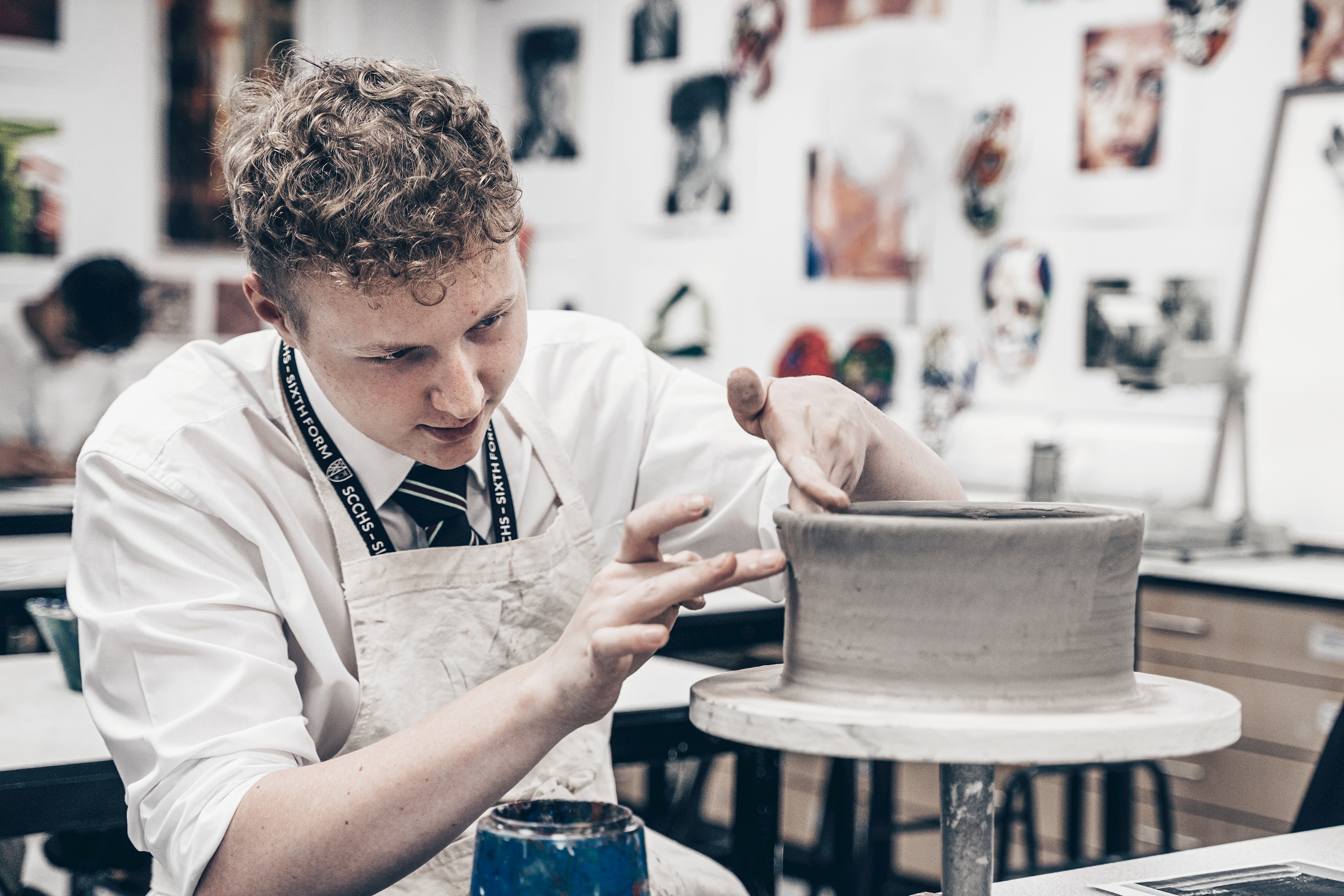
A-level
Students are able to study a range of artistic disciplines: Fine Art, Graphic Communication, Photography and ceramics, with students often doing multiples endorsements. Each student develops personalised projects along progressive trains of thought, exploring concepts and practices that are relevant to themselves.
Overview
Biology is one of the fundamental subjects in an ever more technological world, which provides us with the knowledge to help us understand the world around us. It covers a wide variety of fundamental concepts from: ‘what is living’, to ‘where did we come from’, and ‘how will we survive in the future’?
Our department endeavours to challenge, engage and enthuse our students with a love for Biology and inspire the next generation of Biologists. We want our boys to enquire and question concepts, to investigate and find the answer out for themselves, as well as have a care and knowledge for the world around them. We want them to leave as young men who are scientifically literate, ready for life in a scientific world, and to be critical thinkers, who are able to understand and analyse in a 21st Century society.
Key Stage 3
The Curriculum Overview for each Year Group in Key Stage 3 is available here: Year 7, Year 8 and Year 9.
A-Level
Our students study a broad range of biological concepts including biological molecules, cell structure and division, animal and plant physiology, genetics and evolution, energy transfers, homeostasis, and gene expression. In conjunction with the programme of study, the students undertake many required and additional practicals, which provides them with key investigative skills. All of this provides the students with a detailed understanding of many of the key biological concepts and is crucial for any young man who is looking to study medicine, dentistry, veterinary or other biomedical science at degree.
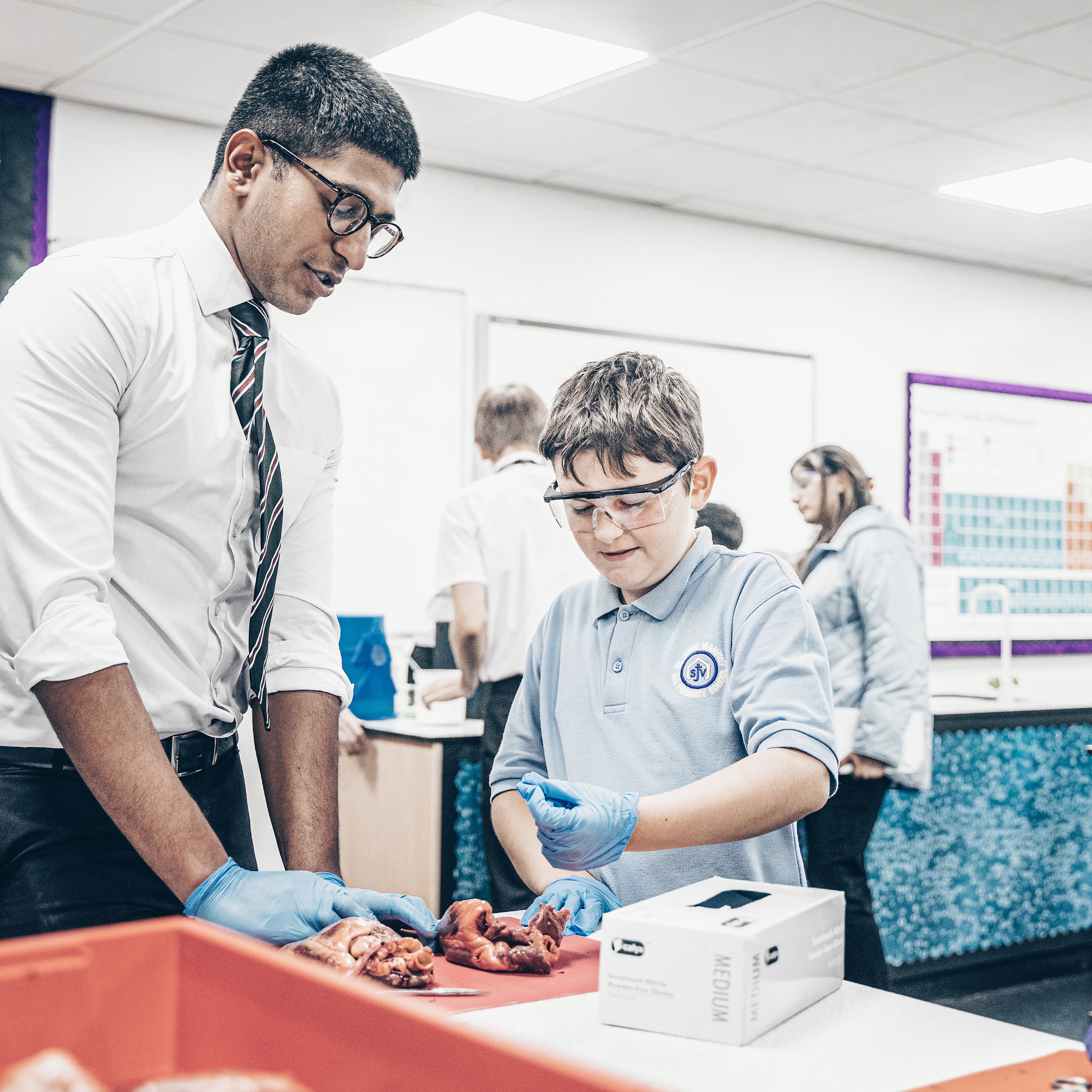
GCSE
Our pupils experience a wide variety of biological concepts, focussing on many key topics, including cells, organisation of organisms, infection and response, bioenergetics, homeostasis, inheritance and evolution, and ecology. As well as the key concepts, our pupils perform and study key biological experiments, developing their key investigative skills. By the end of their course, the boys have a good scientific understanding and are consequently better prepared for life in modern society.
Information about the GCSE curriculum can be found here.
Overview
If you can dream it, you can do it. - Walt Disney
Studying a Business related subject at St Cuthbert’s is exciting, dynamic and challenging, just like the world we live in.
Within the Business Department we aim to develop an in-depth understanding of a range of Business related topics from Marketing to Finance as well as develop analytical and evaluative skills as well as understanding of topical issues that are designed to provide each individual with the knowledge and understanding that underpins modern businesses, as well as providing students with transferable skills which they will later utilise in the world of work.
GCSE
Pupils experience a broad range of topic areas including Enterprise & Entrepreneurship, Understanding external influence on business to Making financial and Human Resource Decisions, which is then applied to local and national Business examples. This helps pupils develop as commercially minded and enterprising individuals.
Information about the GCSE curriculum can be found here.
OCR Cambridge National
Pupils opting for the OCR Cambridge National will study a vocational qualification, equivalent to a GCSE where Enterprise and Marketing is studied in depth with a combination of exams and internally assessed assignments. This provides an excellent foundation for progression to Cambridge Technical and other Level 3 vocational qualifications as well as A Levels and apprenticeships.
Information about the OCR nationals curriculum can be found here.
Business A Level
Students opting for A Level Business will study the Edexcel Specification, as clear progression from GCSE, although it is not necessary for a student to have previously studied Business at GCSE level. Students will cover a diverse range of contemporary and challenging topics which include marketing & people, making strategic decisions and global business.
Economics A Level
Economics is about choice and the impact of our choices on each other. It relates to every aspect of our lives, from the decisions we make as individuals or families to the structures created by governments and firms. An economic way of thinking can help you make better choices. Students opting Economics will study a range of subjects including how markets work and why they fail as well as exploring the impact of globalisation on consumers, firms and the labour market.
OCR Cambridge Technical
The content covered in the course is refreshing and exciting which will allow students to gain the right combination of skills and knowledge for their future careers. Students will be awarded 1 A level (Extended Certificate) and will student five units over two years. This course has a wide range of school based units with practical and wider project based assessments, alongside examinations based on The Business Environment, Working in Business and Business Decisions.
Chemistry is concerned with atoms and their interactions with other atoms. Chemistry allows us to answer some very big questions such as ‘what is the world made of?” and ‘why do reactions occur? We are surrounded by chemistry and by studying it we see how fascinating the world we live in is; from the air that we breathe and the food that we eat to the clothes we wear, the medicines we take and fuels we use. To study Chemistry is to take a key step in understanding our surroundings and appreciate the hidden beauty in the world.
The Chemistry Department strives to give every pupil and student a rigorous grounding in the principles of Chemistry, equipping them with both the knowledge and the skills to become aspirational, ambitious and scientifically literate so that they can make informed decisions on scientific, technological and environmental issues.
Nothing can be more certain than this: that we are just beginning to learn something of the wonders of the world on which we live and move and have our being.
Key Stage 3
The Curriculum Overview for each Year Group in Key Stage 3 is available here: Year 7, Year 8 and Year 9.
GCSE Chemistry: The pupils will study the key principles in Chemistry including atomic structure, bonding, chemical changes, quantitative chemistry, rate of reaction, energy changes in reactions, organic chemistry and chemistry of the atmosphere.
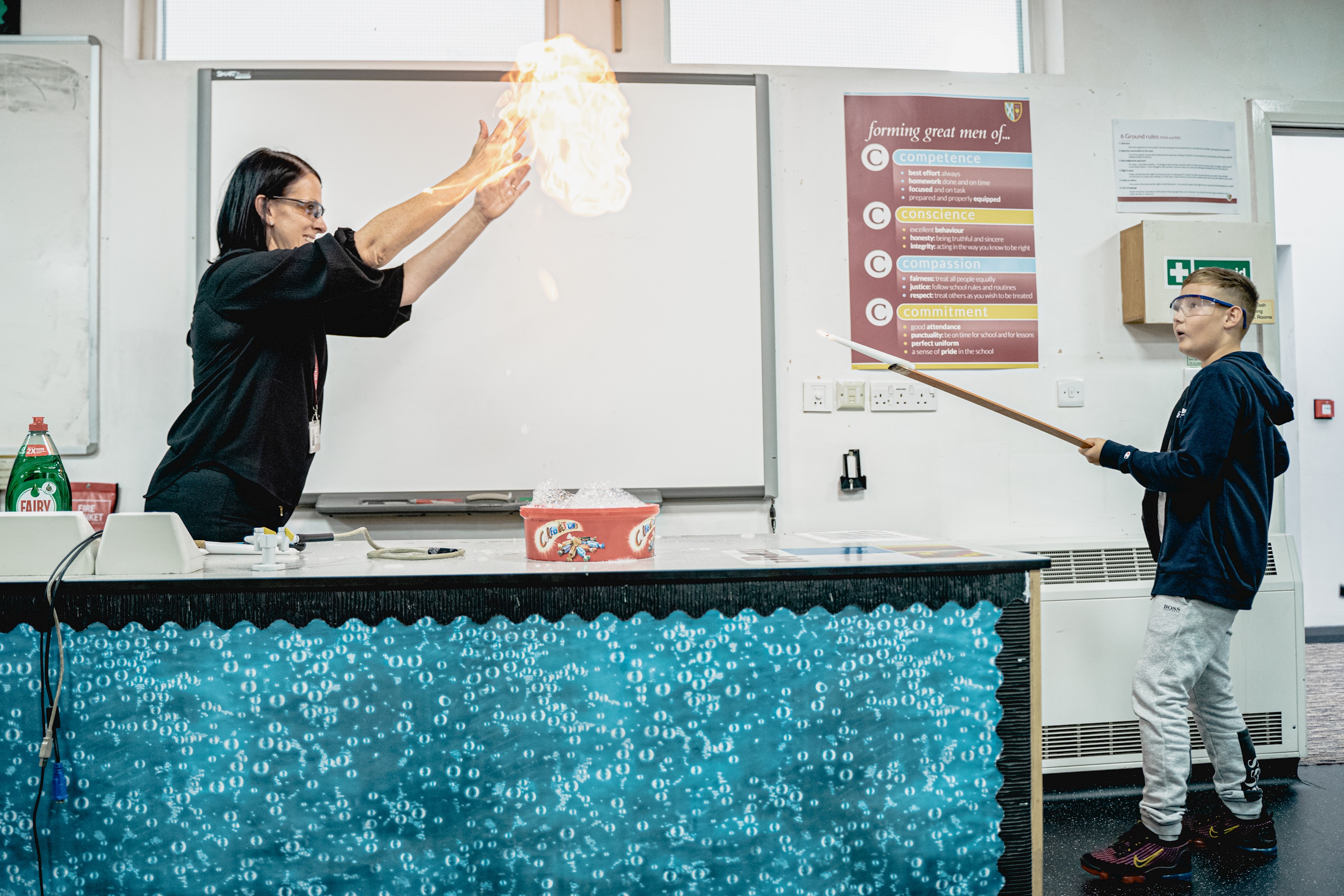
A-Level Chemistry: This course will stretch and challenge the students by extending the study of Physical, Organic and Inorganic Chemistry. Students will also be able to engage in challenging practical skills in the laboratory leading the practical endorsement.
Whether you want to uncover the secrets of the universe, or you want to pursue a career in the 21st century, basic computer programming is an essential skill to learn. – Steven Hawking
Those who can imagine anything, can create the impossible. ― Alan Turing
Computer Science
Computing looks at how computer systems and computers work, and how they are designed and programmed to solve problems. Pupils studying computing will build knowledge on computational systems. Computational thinking provides an awareness into many areas of the curriculum, and influences work at the cutting edge of a wide range of disciplines which are ever growing and changing in this new digital age.
Why is computational thinking so important? It allows us to solve problems, design systems that improve life, and understand the power and limits of AI (artificial intelligence). It is a skill that empowers, and one that all pupils should be aware of and advance capability in. Pupils who can think computationally are better able to conceptualise, understand and use computer-based technology, and so are better prepared for today’s world and the future. You will be a superhero in your workplace if you can think computationally.
Computing is a practical subject, in which invention and resourcefulness are encouraged. The ideas of computing are applied to understanding real-world systems and creating purposeful products. This combination of principles, practice and invention makes computing an extraordinarily useful and intensely creative subject, there really is something for everyone here.
Key Stage 3
The Curriculum Overview for each Year Group in Key Stage 3 is available here: Year 7, Year 8 and Year 9.
Information about the GCSE curriculum can be found here.
Information Technology
The advance of technology is based on making it fit in so that you don't really even notice it, so it's part of everyday life. - Bill Gates, Co-founder of Microsoft.
From smartphones and Wi-Fi, to hashtags and instant messaging: over the last 20 years, technology has dramatically changed the way in which we live and communicate. Does your interest in technology extend beyond the hardware? Are you curious about how digital information is spread? Maybe you just want to know more about computers and how, when and why people use them? If so, ICT could be the course for you.
What is ICT?
ICT is the study of the technology that allows us to store, transmit and distribute information.
Information communications technology (ICT) refers to the study of any technology that uses telecommunication to store, transmit or access digital information. It focuses on the way that modern technology affects our society and how we communicate.
Ok, so it might sound a little complicated, but if you enjoy browsing the internet, happen to own a smartphone or often spend time watching digital television, you’ve already got a pretty good handle on the types of technology ICT covers.
What skills will I get if I study IT?
With any computer or technology-based course, you’re obviously going to develop some pretty solid practical skills - in this case, planning integrated IT systems, database development skills and how to use desk top packages such as Microsoft Publisher and PowerPoint.
What careers is ICT good for?
A university or college course in IT will give you good IT knowledge, ace analytical skills, and excellent problem-solving skills. This means that when it comes to potential careers, the world is pretty much your oyster.
IT career options include:
ICT graduates could also look for employment in the media (broadcast engineer, multimedia broadcaster, sound technician) military (armed forces technical officer, intelligence officer, satellite technician) or finance (credit analyst, commodity broker, financial risk analyst).
Design and Technology opens up pupils to the world of Design and Engineering through a variety of projects where they gain a wide range of skills and technical knowledge. In design projects they develop skills in iterative design such as; investigation skills, user centred design, Freehand and CAD design work, then modelling and testing using a range of approaches. Pupils also develop a wide range of manufacturing skills from; use of hand tools, manufacturing for accuracy using a range of jigs and formers, laser cutter, 3D printing and CNC router to name a few.
Key Stage 3
The Curriculum Overview for each Year Group in Key Stage 3 is available here: Year 7, Year 8 and Year 9.
GCSE
Pupils experience a broad range of topics that develop their thirst for the subject along with the skills for both further study and into industry such as; new and emerging technology, energy generation, systems and mechanisms, materials and their properties and more.
Information about the GCSE curriculum can be found here.
A Level
A Level Product design is an excellent stepping stone into design or engineering due to the wide variety of technical knowledge and design skills that pupils develop. Pupils work on developing their iterative design and practical skills working on live projects which prepares them not only for the Non examined assessment but for their future careers in the design and engineering industry.
Overview
Studying English is a life-enhancing endeavour. Pupils gain a deeper understanding of the world and of the lives of others in different times and different places. They explore what it means to be human. As well as this, pupils will develop the ability to analyse how language is used and become more expert in expressing themselves through language, both in writing and in speech. The aim of English teaching at all levels at St Cuthbert’s is equip pupils with the knowledge and skills they need to achieve success in their careers and inspire them to enrich their cultural lives.
Key Stage 3
The Curriculum Overview for each Year Group in Key Stage 3 is available here: Year 7, Year 8 and Year 9.
GCSE
Pupils will study both the English Language and English Literature course at GCSE (AQA board). Reading is at the heart of these courses and we encourage pupils to read widely and often. Through their reading of classic and contemporary Literature, pupils develop their ability to analyse texts and show their understanding of how writers use language and structure to shape meaning and create an impact on the reader. These skills overlap with the reading elements of the English Language course, although here we add quality non-fiction texts, which pupils will summarise, compare and analyse. Writing skills are also strongly developed in English Language. Pupils produce imaginative and controlled creative writing, as well as learning how to produce effective arguments to express their point of view. Delivering presentations is also a part of the course, so pupils develop the confidence to speak clearly and confidently to an audience.
Information about the GCSE curriculum can be found here.
Information about the GCSE Literature curriculum can be found here.
A-level
A-level courses are offered in English Language (AQA) and English Literature (Edexcel).
A-level English Language
The English Language course explores the use of language in all of its multifaceted variety – this will include fiction and non-fiction texts, the media and social media, computer-mediated communication, spoken language used in social conversations, language change and the language development of children. The course gives students fascinating insights into how language has developed over time and how it is used in different ways to achieve different purposes. Students will develop a love of language and the ability to analyse texts in precise, technical detail. They will be able to explore their own interests through a language investigation in the coursework unit, and also gain greater expertise in writing, using language to communicate with clarity and control.
A-level English Literature
On the A-level English Literature students study some of the finest works that have ever been written and learn to appreciate them from a critical and analytical point of view. Student will enhance their love of reading, explore texts through lively classroom discussion and develop the rigorous and highly-desirable academic skill of writing analytical essays. The course will include the study of Shakespeare plays and other drama, the study of prose texts that are linked by theme and the study of poetry from a movement or specific poet as well as unseen poetry. There is also the opportunity for students to follow their own reading interests in the coursework unit, and also to develop independent study skills that can help to prepare them for university.
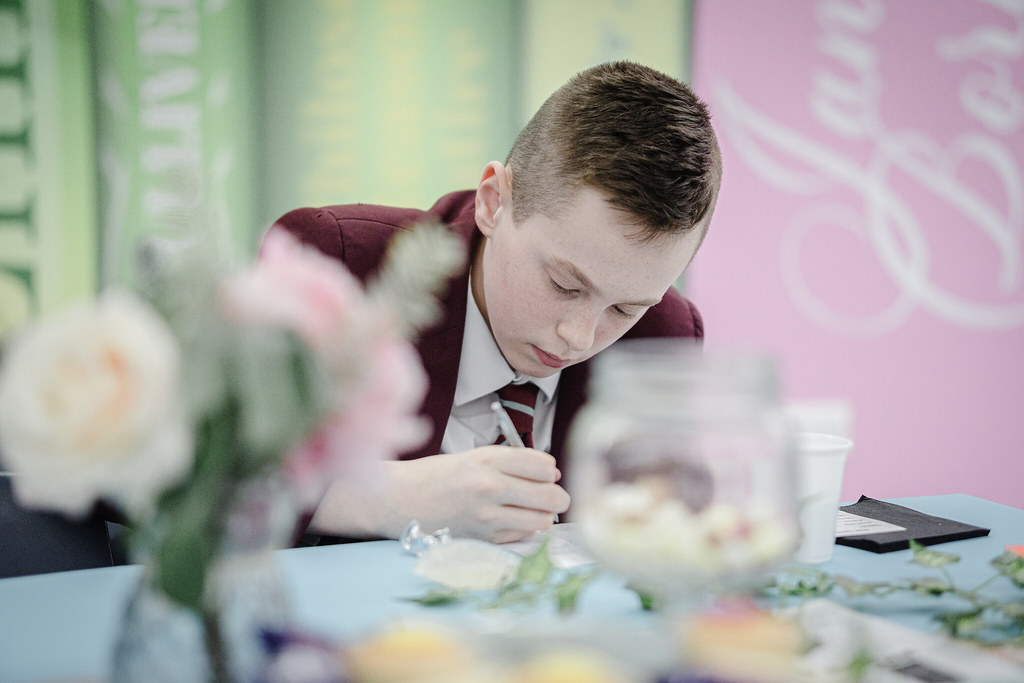
The study of geography is about more than just memorising places on a map. It’s about understanding the complexity of our world, appreciating the diversity of cultures that exists across continents. And in the end, it’s about using all that knowledge to help bridge divides and bring people together.
-Barack Obama
Why study Geography at St. Cuthbert’s?
Geography at St. Cuthbert’s is dynamic. From KS3 to A Level, pupils are taught a variety of topics which cover themes such as: the interactions and behaviour within human life, to the processes and natural wonders which shape the physical environment. Geography equips pupils with skills to explore much more than geographic locations. In the geography curriculum, we learn how landscapes form over thousands of years, how populations are distributed and even how the borders across the world favour some countries but restrict many others. Geography also has cross-curricular links. Geography enhances practical English and Maths skills; it compliments historical contexts; and gives us a deeper understanding of cultures and religion around the world. Our pupils become politically aware, more understanding of conflicts and, most favourably, develop the ability to scrutinise global prejudices and inequalities. It [Geography] bridges divides and brings people together. It is more than an interesting subject, Geography is important.
Key Stage 3
The Curriculum Overview for each Year Group in Key Stage 3 is available here: Year 7, Year 8 and Year 9.
GCSE Geography at St. Cuthbert’s
Our GCSE Geography course follows the AQA Exam Board specification. In the two years following the course, pupils will be taught topics in both human and physical geography. In human geography topics involve study the reasons for uneven development within global society. We study the urban world and the success, or failure, of cities and sustainable living. Most topically, pupils will learn about the availability of resources such as food; energy and water and the long-lasting implications of global warming on the scarcity of these resources globally. In physical geography, pupils will learn about the key processes and science behind the landscape of the UK; from the North-East coastline to the River Tees in the Pennines. Further afield, pupils will learn about the intricate, interdependent ecosystems within tropical rainforests and deserts as well as the destructive power of hazards such as volcanoes, earthquakes and hurricanes. The course also offers pupils the chance to develop an independent study conducting and evaluating their own fieldwork. This involves practical time away from the classroom where pupils can become investigators of a certain geographical issue or concern.
Information about the GCSE curriculum can be found here.
A-Level Geography at St. Cuthbert’s
Students opting for A Level Geography will study the AQA Syllabus. Russell Group Universities recognise A Level geography as one of the key ‘facilitating’ subjects for entry to degree level study. The course offers a breadth of Human and Physical topics studied across the two years which delve deep into the world we live in. Students will cover a diverse range of contemporary and challenging topics which include: geographical processes, systems, place, scale and space in both Physical and Human Geography. Students will have the opportunity to conduct primary data collection on a variety of fieldwork trips which will form the basis of their independent investigations, accounting for 20% of their final grade.
History is important because it helps us learn from the past. It allows an understanding of the world, how it has changed to become the one in which we live today. It opens the door to new and different cultures and allows us to develop an appreciation of those different to our own. It develops the ability to form judgements and support the with evidence. History is interesting and relevant.
Key Stage 3
The Curriculum Overview for each Year Group in Key Stage 3 is available here: Year 7, Year 8 and Year 9.
At GCSE we study a range of time periods that allow the development of key historical skills such as source analysis and historical interpretation. Key areas of study are the development of international relations 1954-91, Weimar and Nazi Germany, Henry VIII and his ministers and Crime and punishment in Britain.
Information about the GCSE curriculum can be found here.
We offer a challenging but rewarding History course that invites students to develop their own views on key elements of History. The in breadth study of the Tudor dynasty allows assessment of change throughout this period of British History and to what extent it has formed the Britain that we live in today. The Russia depth study 1917-54 provides the opportunity to examine the significance of key events in History and how the role of key individuals can have impact on so many people’s lives.
Quotes:
A people without the knowledge of their past history, origin and culture is like a tree without roots. – Marcus Garvey
The more you know about the past, the better prepared you are for the future. - Theodore Roosevel
Mathematics is the ‘universal language’ understood across different cultures, countries and languages. We understand that life skills such as logical thinking and problem solving are developed in the subject.
At St Cuthbert’s we are passionate about Mathematics and hold a firm belief that all our students are capable of becoming mathematicians. We are a forward thinking department, who employ the latest strategies, particularly Shanghai Mastery Mathematics, ensuring students have both a deep understanding of the topic as well as being able to draw connections across the subject area.
We are an enthusiastic department who are wholly committed to inspiring the next generation of mathematicians no matter what their ability.
Numbers constitute the only universal language
Nathanael West
Key Stage 3
The Curriculum Overview for each Year Group in Key Stage 3 is available here: Year 7, Year 8 and Year 9.
Students develop the ability to reason mathematically. At this level students evolve to become fluent in mathematical language. They advance their problem solving skills by selecting appropriate methods and techniques to apply to unfamiliar and non-routine problems.
Information about the GCSE curriculum can be found here.
Mathematics at A Level is one the most popular choices at St Cuthbert’s. We also offer Further Mathematics A Level. Students further improve their mathematical knowledge to make logical and reasoned decisions in solving problems. They develop their ability to make deductions and inferences and draw conclusions by using mathematical reasoning.
Learning another language is not only learning different words for the same things, but learning another way to think about things. – Flora Lewis
Learning a foreign language allows for an insight into other cultures, nurturing pupils’ curiosity and broadening horizons, allowing them to become more tolerant, open-minded citizens of the world. It is a diverse subject, which practises a variety of necessary communication skills. Through learning another language, pupils have a more profound understanding of their own language and culture.
The MFL Department challenges all pupils by exposing all classes to the target language as well as the culture, politics and history of the countries in question. With currently three languages on offer, the department aims to broaden pupils’ understanding of the world and develop life-long linguistic ability. French, Spanish and Mandarin are offered in KS3-5, alongside Italian in KS5 as an enrichment to A-Level studies.
If you talk to a man in a language he understands, it goes to his head. If you talk to him in his language, that goes to his heart. - Nelson Mandela
Key Stage 3
The Curriculum Overview for each Year Group in Key Stage 3 is available here: Year 7, Year 8 and Year 9.
GCSE
Pupils experience a broad range of topic areas covering the three themes of: Identity & Culture, Local, national, international and global areas of interest and Current and future study and employment.
The course structure allows pupils to improve their skills in listening, speaking, reading and writing which are separately assessed with an equal weighting in the final GCSE examination.
Information about the GCSE French curriculum can be found here.
Information about the GCSE Mandarin curriculum can be found here.
Information about the GCSE Spanish curriculum can be found here.
A LEVEL
At A-level, students build upon their cultural and linguistic skills acquired at GCSE. The course covers a number of social and political areas of study such as multiculturalism, history and societal changes. Alongside the topic areas, students also study a piece of literature and a film, further providing opportunities for enrichment and exploration of culture. Assessment takes the form of two written papers and a speaking assessment for which they research and present a topic relating to the target language country.
Overview
The Physics department at St Cuthbert’s High School is focused on delivering quality first teaching to help inspire the next generation of Physicists. As humanity advances so does the need for Physics therefore we aim to produce scientifically literate individuals with a strong background knowledge of physics so that they can continue to learn and discover and make educated and informed decisions based on the evidence at hand.
“The important thing is not to stop questioning. Curiosity has its own reason for existence. One cannot help but be in awe when he contemplates the mysteries of eternity, of life, of the marvellous structure of reality. It is enough if one tries merely to comprehend a little of this mystery each day.”
― Albert Einstein
As the needs for our society change the demand for Physicists increases. There are many careers in Physics such as aerospace and defence, energy and renewable energy, engineering, health and medicine, instrumentation, manufacturing meteorology and climate change, nanotechnology and telecommunications. We aim to give our pupils the tools and knowledge for success if they choose to pursue a physics related career.
Key Stage 3
The Curriculum Overview for each Year Group in Key Stage 3 is available here: Year 7, Year 8 and Year 9.
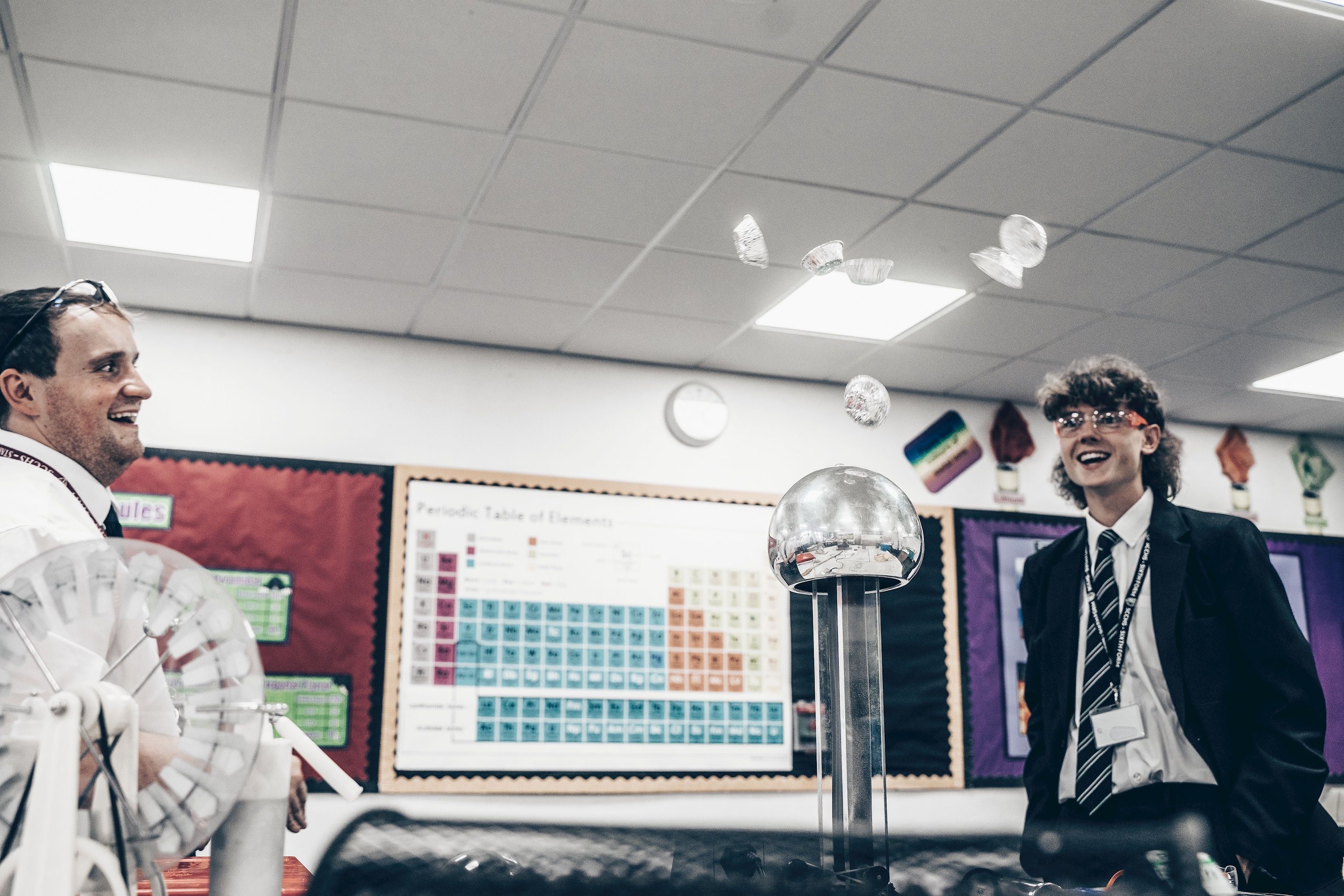
GCSE
Pupils cover the key principles of Physics such as Energy, the Particle Model of Matter, Electricity, Atoms and Radiation, Forces, Waves, Electromagnetism and Space in their GCSE course. Alongside learning the broad range of areas of Physics pupils are given the opportunity to carry out a wide range of experimental techniques to investigate the principles of Physics in everyday life.
A Level
Our Physics A Level offers our the students the chance to study a wide variety of topics such as Particles and Radiation, Waves, Mechanics and Materials, Electricity, Further mechanics and thermal physics, Fields and their consequences, Nuclear physics and Astrophysics. Learning such a variety of fields allows our students to develop their knowledge and prepare them for Physics related careers or courses at university.
BTEC Science
Our vocational BTEC Science course offers our students the opportunity to study the core principles of Biology, Chemistry and Physics. Over the two year course students will be taught a range content and carry out a large variety of practical’s. The course is designed to enable our students to move on to university or practical based jobs/apprenticeships in science.
Music is a well-respected course, accepted by all colleges and top universities. It is academically rigorous, fulfilling and challenging and the music industry is worth 4.5 billion to the UK economy each year. Music broadens horizons, enables creative learning and there are more opportunities for jobs and higher education places with this qualification than you may first think. We use a structured approach to listening, performing, composing, theory and the use of music technology. As well as traditional performing we use Sibelius, Protools, Mixcraft and Garage band alongside web based software at all key stages to invigorate our curriculums.
Music gives a soul to the universe, wings to the mind, flight to the imagination, and life to everything.
Plato
We offer a number of extra-curricular groups including; St Cuthbert’s Big Band, Choir, Little Big Band, Brass ensemble, Mass/liturgical band, GCSE Ensemble Groups, Saxophone Ensemble, and Student led groups and Individual student bands.
Key Stage 3
The Curriculum Overview for each Year Group in Key Stage 3 is available here: Year 7, Year 8 and Year 9.
At GCSE, music is a practical based course which requires pupils to Perform, Compose and Listen/appraise music. In addition to this, pupils will be required to develop their theoretical understanding of music as well as their use of music ICT.
Pupils will develop skills of solo and ensemble performing and compose in contrasting styles gaining an insight into how music in constructed from initial ideas to the finished product. Pupils will also learn how to analyse music in a variety of styles, through both score analysis and listening, and discover the social context in which music has been composed over the last 400 years.
Awarding Body: Edexcel
Information about the GCSE curriculum can be found here.
We follow the AQA syllabus at A Level. For their final recording students need to prepare a performance of 10-15 minutes, approximately at Grade 7 standard. Students also produce two contrasting compositions, and they sit a written paper comprising listening and essay questions based on the set works of the course. The set works are taken from the compulsory classical area of study, focusing on the Baroque Concerto and of two further areas of study (such as Popular Music, Film Music, Jazz, or Art Music since 1910).
Physical Education has a unique contribution to make to the total education of the individual, a learning process that will start early in the life of the child and which will hopefully continue to provide a healthy and active lifestyle in adulthood.
In PE we aim to provide students with opportunities to improve their physical abilities in competitive and non-competitive situations, placing a strong emphasis on participation and enjoyment. A broad, balanced, progressive, differentiated and relevant curriculum which focuses on the importance of following a healthy lifestyle is offered. This enables us to provide high quality physical education and school sport to all students.
Physical education is the most effective means of providing all children and youth with the skills, attitudes, values, knowledge and understanding for lifelong participation in society.
The Declaration of Berlin 2013
UNESCO’s World Sports Ministers Conference (MINEPS V)
Key Stage 3
The Curriculum Overview for each Year Group in Key Stage 3 is available here: Year 7, Year 8 and Year 9.
GCSE Physical Education will equip pupils with the knowledge, understanding, skills and values they need to be able to develop and maintain their performance in physical activities.
The theory topics covered will help students of all abilities to develop a well-rounded skill set and prepare them for progression to further studies.
Information about the GCSE curriculum can be found here.
The course covers all aspects of sport from physiology to psychology, encompassing concepts from skill acquisition to topics that reflect contemporary changes in sport and society.
A-level Physical Education allows students to gain dynamic theoretical and practical skills needed for further education or work.
Our Cambridge National in Sport Studies enables students to develop and apply knowledge of sports-related activities. They explore contemporary issues in sport, different ways of being involved in the sports industry, and the impact of sport on wider society.
Our Cambridge Technicals in Sport and Physical Activity provides students with practical opportunities to develop relevant core knowledge and skills. Students further develop their skills through specialist pathways that help them deliver sport and physical activity to a wide range of participants.
Studying Religious Education encourages pupils to engage with life’s most fundamental questions and issues, such as whether war and religion are compatible, the nature of knowledge, why there are so many Christian churches, whether suffering is our fault or God's and what happens when we die.
The RE Department at St Cuthbert's is one of the top performing departments in the Diocese. The department’s use of the most up to date educational research ensures our subject specialists teach exciting lessons, and our co-curricular offer bolster our stellar reputation. Our co-curricular offer includes; Excellence in Theology seminars, Laudato Si Club, SVP Youth, CAFOD Club, Law Club, the Fortis Dux Award in Catholic leadership, public speaking competitions, Spirited Arts Competition, the Pope John Paul II Award and the Guild of St Stephen.
In every RE lesson, our boys are working towards the collective goal of 'becoming an excellent Theologian.' We want our pupils to be confident and curious, inquisitive and brave, opinionated and well-mannered.
Religious Education/Studies is a highly sought-after qualification which demonstrates that you have a reflective and enquiring mind, that you are able to think rationally, study documents, debate moral issues and show you have informed opinions. Some students have used this qualification in the caring and teaching professions, media, administration, or the legal professions and some have even used it in banking!
Key Stage 3
The Curriculum Overview for each Year Group in Key Stage 3 is available here: Year 7, Year 8 and Year 9.
All boys at St Cuthbert's are taught RE at GCSE. We follow the Eduqas Route B specification.
Information about the GCSE curriculum can be found here.
Those Sixth Form students to choose Religious Studies read the OCR A Level H573 specification where they will study Philosophy of Religion, Ethics and The Development of Christian Thought. Topics on this course include; the ancient Greek philosophies of Plato and Aristotle, Sexual Ethics, Gender and Theology, Liberation Theology and the Challenge of Secularism.
St Cuthbert’s Catholic High School, Gretna Rd, Newcastle upon Tyne, NE15 7PX
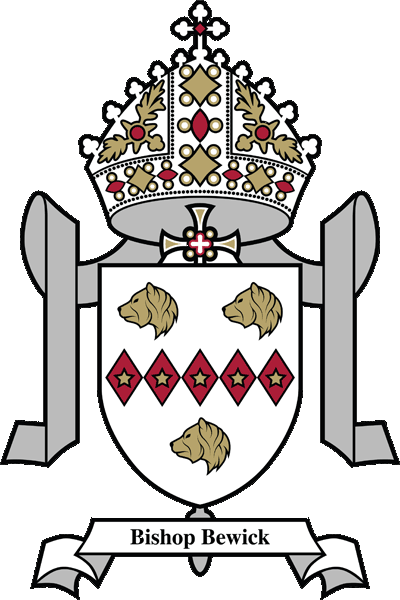
St Cuthbert’s Catholic High School is a proud member of the Bishop Bewick Catholic Education Trust. The Bishop Bewick Catholic Education Trust is a company limited by guarantee registered in England and Wales. Company Registration No. 7841435. www.bishopbewickcet.org